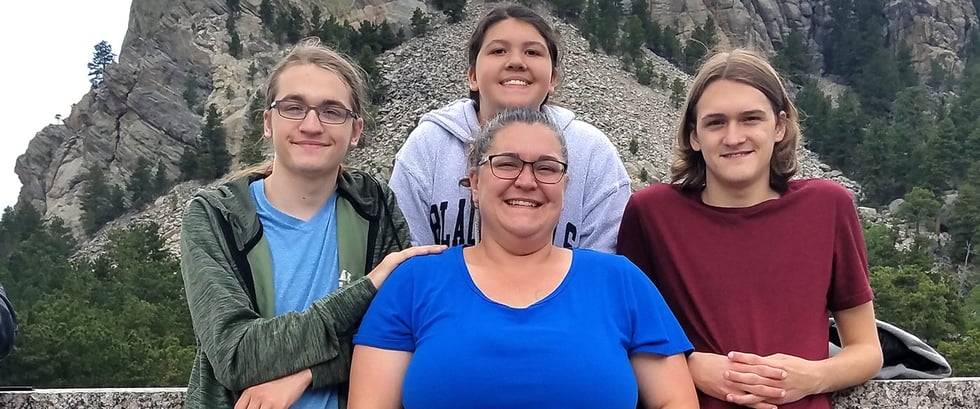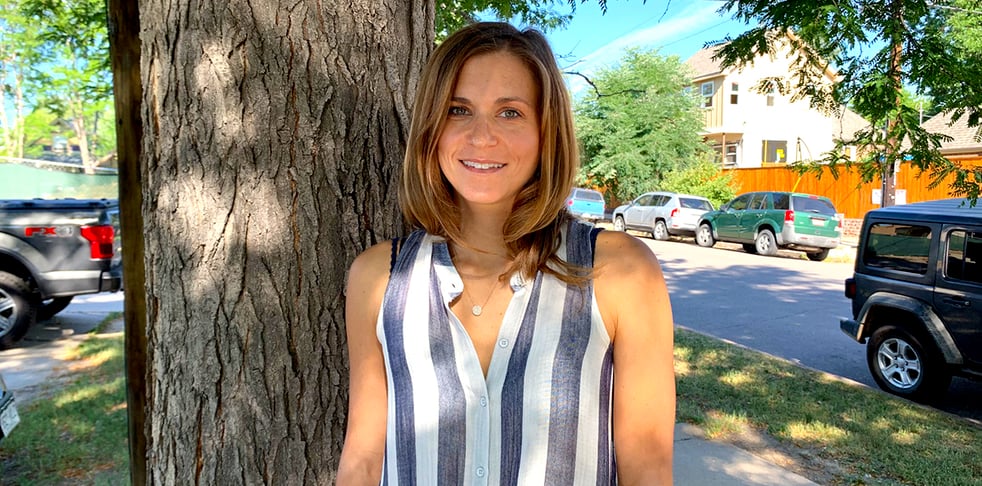With a 3-year-old daughter and a second baby on the way, Emily Daniels was diagnosed with Stage IV lung cancer. Young and otherwise healthy, Daniels had no known risk factors for the disease.
On a new journey with his family in Colorado, photographer Scott Wilson learned he had Stage IV colorectal cancer shortly after moving to Denver from the UK. He was 48, two years shy of the generally recommended first colonoscopy screening.
Both prognoses would have been grimmer had it not been for the incredible breakthroughs in cancer treatment today. The population of cancer survivors has surpassed 32 million worldwide because of these medical game-changers, a feat to be celebrated this Sunday (June 7) during National Cancer Survivors Day.
As the only National Cancer Institute-designated center in Colorado, the University of Colorado Cancer Center on the CU Anschutz Medical Campus has been a big player in changing the outcomes of cancer diagnoses, attracting patients worldwide. In recognition of the awareness day, we offer a brief glimpse of the center’s many success stories.
Technology, Teamwork and Trials Add Up to Top Care
Just over three years ago, a doctor told Karen Possehl the tumors he discovered in her pancreas and liver would kill her within months. No treatment, no surgery, would change that fact, he said. This week, Possehl told an audience filling an auditorium on the University of Colorado Anschutz Medical Campus that she has survived because of the premier care she found at the CU Cancer Center.
Pancreatic Cancer Journey Underscores Importance of a Second Opinion
A year ago, when Colorado was getting pummeled by usual March snowstorms – not a pandemic – Nancy White strolled out on a rare warm day to do some yard work. Leaves bagged, she went back inside and faintly touched her side. Wham! She suddenly seized up in pain. Strange. She hadn’t bumped her hip while outside, she thought.The next day, her primary care physician sent her to a hospital in Lafayette for a CT scan and blood test. A shocking result: a 5-centimeter tumor in the center of her pancreas. It was entangled with three blood vessels.

Scott Wilson raises awareness of colorectal cancer while dealing with the disease. He was diagnosed Stage IV at age 48.
Focusing in on Colorectal Cancer: Is 45 the New 50?
A pandemic stole Alba Wilson-Axpe’s chance at the podium recently. But when the Colorado Legislature re-opens its doors to the public, odds are high the 14-year-old will be back to testify. While COVID-19 has stopped much of the world in its tracks, the high school freshman from Greenwood Village still plans on telling lawmakers how colorectal cancer dominated her family’s last four years since her dad was diagnosed with the disease.
Veteran’s Pancreatic Cancer Caught ‘At Just the Right Time’
Steve Becker always looks forward to Veteran’s Day. He and his father, Don, did hitches in the Navy, so it’s a special day they set aside to hang out and reflect on their service to the nation. About five years ago, however, they got a shock. A physician in Longmont, investigating a bulge in Don’s abdomen, discovered a mass on his pancreas. The doctor and Don’s daughter, who is a nurse, both recommended he immediately get an appointment with Richard Schulick, MD, director of the University of Colorado Cancer Center and chair of the Department of Surgery. The Cancer Center multidisciplinary team consulted on Don’s case, and the diagnosis was one of the worst anyone can hear: pancreatic cancer.
Emily Daniels credits CU Anschutz doctors for saving her life after a shocking lung cancer diagnosis.
Lung cancer puzzle leads to breakthrough discovery
Getting ready to catch a morning flight to Chicago in February 2018, Emily Daniels felt a strange tightness in her chest. She noticed a shortness of breath. Taking her mother’s advice, she called her obstetrician who said she should go to the ER. She remembers thinking, “Emergency room … is that really necessary?” Nonetheless, Emily went to an ER near her home in Lakewood and re-booked for a 5 p.m. flight, thinking she’d still make her business trip. After an initial test, doctors advised a CT scan, which revealed two blood clots in Emily’s lungs and a mass in the bottom of her right lung.
Lung Cancer Survivors Celebrate Life and Hope
A decade ago, Ellen Smith went through the “traditional three” therapies for her lung cancer — radiation, surgery and chemotherapy — but still her cancer progressed to Stage IV and the prognosis was bleak. Her physician said he’d done all he could do. Her three adult children did some online research and found the website for the CU Cancer Center at the Anschutz Medical Campus. Also, a former co-worker who performed research at CU Anschutz strongly suggested Smith visit the CU Cancer Center. “She probably suggested it five times, and that saved my life,” Smith said. “I say the Lord and CU Anschutz are a good combo, because they saved my life.”

Nichol Miller, mother of three, has witnessed proms and graduations she never thought she would see since being treated at CU Anschutz.
CU Anschutz Drives Cancer Breakthrough
Under the sunny skies that return to Portland, Ore., every summer, Nichol Miller is enjoying a life of family and purpose. The mother of three soaks in the milestones of graduations, weddings and anniversaries as well as the simple pleasures of seeing her kids head off to school and her husband come home from work. All this seemed improbable just a few years ago – even impossible. Stricken with an aggressive soft-tissue sarcoma that started in her hip flexor and quickly spread to her lungs, Miller traveled to Denver to participate in a clinical trial of an experimental therapy. She called it her “hail Mary.”
Colorectal cancer is not an “old person” disease
Diagnosed with Stage III colorectal cancer at just 38 years old, Jimmy Zannon was a far cry from the “typical” patient. Colorectal cancer was once (and often is still) considered a disease of the elderly. With the average age of diagnosis being 68 in men and 72 in women, it’s no surprise that people find it hard to believe colorectal cancer is diagnosed in individuals in their 20s and 30s.
From hours to live to thriving: Johnna’s story
Johnna Vinson knew something was very wrong, but she couldn’t seem to get an answer even after months of testing. In July of 2017 she found herself in the emergency room with the words “another 24 hours and you probably wouldn’t be here” hanging over her head.Intensive treatment at the University of Colorado Cancer Center saved her life and helped her find her “new normal.”
Photo at top: Karen Possehl stands with two of her cancer care providers, Dr. Christopher Lieu, center, and Dr. Richard Schulick.


.png)
.jpg)
